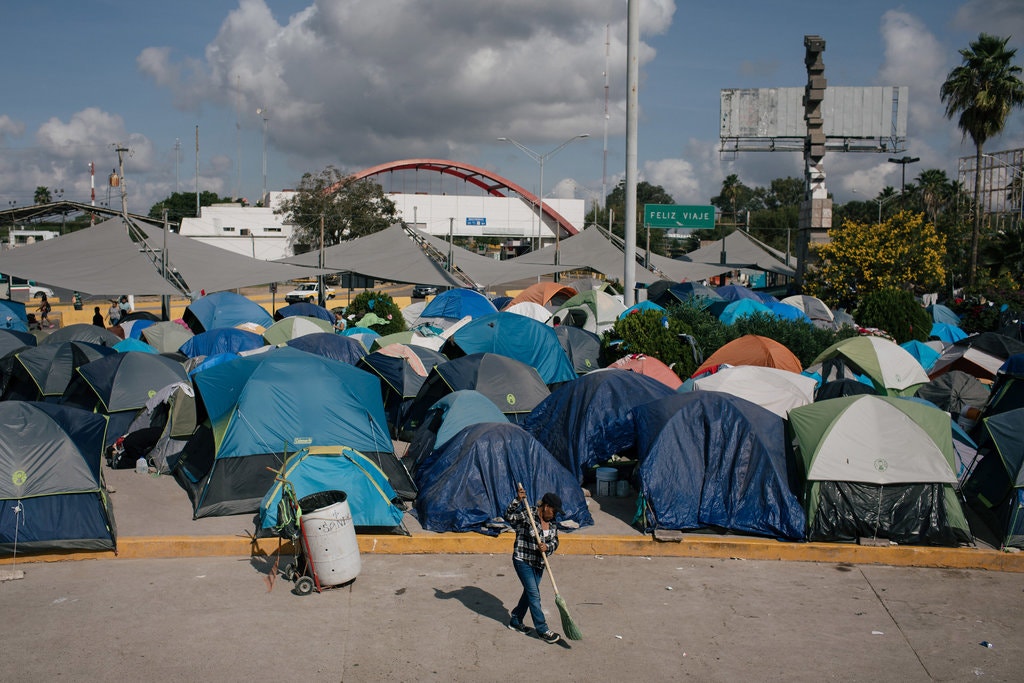 This Protecting Immigrant Communities blog post is written by our Spring 2020 Immigration Policy Intern, Emma Yznaga.
This Protecting Immigrant Communities blog post is written by our Spring 2020 Immigration Policy Intern, Emma Yznaga.
One of the most poignant questions I have been asked during my conversations with asylum seekers at the U.S-Mexico border is “where are you from?”
I point towards the international bridge and tell them Brownsville, Texas, not more than two miles from the migrant tent camps. The distance between their suffering and the house I grew up in is so short, but for them, so incredibly far. As I grew up on the border, I never saw the dividing line as a barrier; it was only a bridge that connected the two cultures that define my identity. As the physical and imaginary border walls have grown, the border has shifted from a symbol of transnational unity to one of stark division. However, the communities that belong to both sides are my communities. A humanitarian crisis unfolding at the doorstep of home is not something I can place out of sight, out of mind.
My involvement in border issues and immigrant’s rights advocacy started in the spring of 2018 when the U.S-Mexico border became the epicenter of family separations caused by the “zero-tolerance” policy. Nearly 3,000 children were separated from their parents before President Trump signed an executive order halting the separations as a result of pressure from immigrant advocates and the groups of concerned citizens who attended the Families Belong Together rallies across the country. It was then, after watching my community react with so much passion and anger at the Brownsville rally, that I knew I needed to join the fight. The executive order was a win for the border – but it did not stop separations completely, nor was it the end of federal policy changes that would continue to harm asylum-seekers.
 In January 2019, the Trump administration implemented the Migrant Protection Protocols (MPP), also known as the “Remain in Mexico” policy. Under this policy, asylum-seekers are no longer allowed to wait in the U.S. while their asylum cases are considered and are instructed to remain in Mexico. With no resources and nowhere to go, the majority of asylum-seekers live in tent camps along the border. Locally-organized grassroots advocacy networks became the only source of support for asylum-seekers.
In January 2019, the Trump administration implemented the Migrant Protection Protocols (MPP), also known as the “Remain in Mexico” policy. Under this policy, asylum-seekers are no longer allowed to wait in the U.S. while their asylum cases are considered and are instructed to remain in Mexico. With no resources and nowhere to go, the majority of asylum-seekers live in tent camps along the border. Locally-organized grassroots advocacy networks became the only source of support for asylum-seekers.
Even before the numbers of asylum-seekers in Matamoros began to rise exponentially as a result of MPP, Team Brownsville had been making daily trips to provide them with necessities to survive. I started volunteering with them in 2018, when the numbers were around 100 – now, they feed over 1,000 asylum-seekers a day. Other equally important advocacy groups based out of the Rio Grande Valley who work tirelessly to support asylum-seekers include the Angry Tia’s and Abuelas, Catholic Charities, and the ACLU of Texas. These people have taken it upon themselves to be the difference on the ground for the asylum-seeking community. Because of the initiatives of these groups, asylum-seekers receive the resources that the U.S and Mexican governments should be responsible for providing them with Their passion and relentless dedication to advocate for immigrant’s rights have inspired me to spend my professional career doing the same.
I left Brownsville in August 2018 to start my undergraduate career at the University of Texas at Austin. Leaving Brownsville has physically separated me from the migrant community, but it has also brought me closer to an understanding of how I can support substantive change in the future. I came across the Children’s Defense Fund-Texas, which works in local, statewide, and national partnerships to push back against harmful policies and regulations, and to protect and defend immigrant families. The values of this organization are in-line with the passion that I and the local organizations at the border have to protect the asylum-seeking community. Joining their team as the Immigration Policy intern has given me the opportunity to keep connected with the immigrant community both at the border and spread across the country through research and advocacy initiatives. CDF-Texas is fighting to bring a voice to the voiceless immigrant community through independent and partner campaigns like Protecting Immigrant Families. For as long as there will be immigrant communities in need of support, there will be so much work to be done; I’m proud to have joined the movement.
